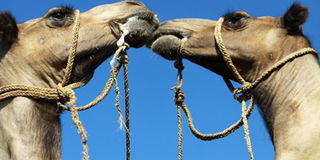Government rolls out programme to give camels to pastoralists

Camels provide a direct livelihood to millions of pastoralists in Kenya. The government has rolled out a programme to give camels to pastoralists in Arid and Semi-Arid Lands (Asal) in the country. Over of 75 camels were handed over to five self-help groups and two schools each in ASAL areas in Baringo, Elgeyo-Marakwet, West Pokot and Turkana counties Wednesday. PHOTO/FILE
What you need to know:
- This is expected to boost camel population from the current three million and enhance food security.
- During the function, over of 75 camels were handed over to five self-help groups and two schools.
- Camel milk production stood at 340 million litres in 2008 alone which he said has increased significantly by 10 per cent by now.
- Kenya Camel Association (KCA) chairman Patrick Katelo said that 14 counties are targeted in the project
The government has rolled out a programme to give camels to pastoralists in Arid and Semi-Arid Lands (Asal) in the country.
This is expected to boost camel population from the current three million and enhance food security and mitigate against the effects of climatic change, Deputy President William Ruto has said.
Mr Ruto said this in a speech read on his behalf by Agriculture Cabinet Secretary Felix Koske at a function was held at Chemolingot in Tiaty Constituency Wednesday.
During the function, over of 75 camels were handed over to five self-help groups and two schools each in ASAL areas in Baringo, Elgeyo-Marakwet, West Pokot and Turkana counties.
Mr Ruto said that camels provide a direct livelihood to millions of pastoralists in Kenya.
CAMEL MILK
Camel milk production stood at 340 million litres in 2008 which he said has increased significantly by 10 per cent by now.
“Camel production is very sustainable owing to its adaptability to harsh environments.
The camel is also a more reliable milk producer than other classes of livestock especially during the dry season,” said the Deputy President.
He said that in a bid to boost food security in the country, the government will promote appropriate technologies to add value to camel milk which he said will subsequently lead to increased income for farmers.
“To achieve this goal, pastoralists and extension workers will be provided with necessary skills to boost camel milk and meat production.
The government will further increase access to water to save the time used in search of this resource,” said Mr Ruto.
He called on residents in cattle rusting prone areas to adopt camel production which he said does not compete for limited resources with other domestic animals.
REDUCE CONFLICTS
This, he added, will help reduce conflicts in the region.
“The government is currently working on the Camel Production Policy that recognises the vital role the camel plays in the livelihoods of the keepers.
The policy is expected to provide overall guidance to all the players in the camel industry,” said Mr Ruto.
Kenya Camel Association (KCA) chairman Patrick Katelo said that 14 counties are targeted in the project which is being spearheaded by the Ministry of Agriculture, Livestock and Fisheries through the Asal Based Livestock and Rural Livelihoods Support Project (Allpro).
He said that KCA has embarked on a camel exchange programme with the Botswana Tourism Board in order to upgrade various breeds and boost camel meat and milk production in the country.
“The camel is an animal that helps in peace keeping as it has significantly reduced conflicts between warring pastoralist communities,” said Mr Katelo.
He added that Kajiado, Narok and Kitui are also being targeted in the programme.





